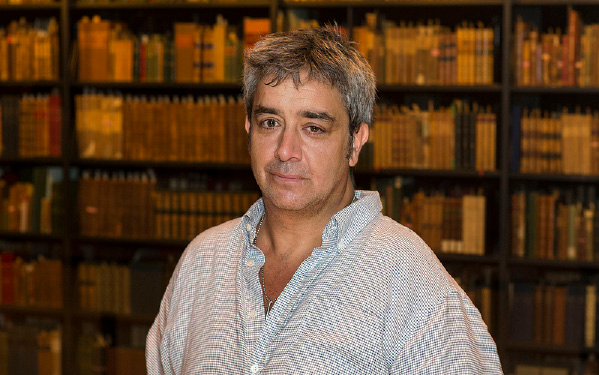
The actor and Pulitzer-prize winning playwright Stephen Adly Guirgis was made, not born, a writer. Throughout his recent talk, held last Thursday evening in the KTSA auditorium, Guirgis maintained that he writes in order to act, and that he doesn’t particularly like writing. He authored his first one-act play at the behest of his friend John Ortiz, one of the founders of LAByrinth Theater Company in New York City, of which Guirgis was also a seminal member. The company has since fostered a range of stars, among them Liza Colón-Zayas, who recently became the first Latina to win an Emmy for Best Supporting Actress in a Comedy Series; Eric Bogosian, who won a Pulitzer in 1987 for his play Talk Radio, and also appears in Interview with the Vampire, Succession and Uncut Gems; Oscar-winner Sam Rockwell, The Green Mile, Three Billboards Outside of Ebbing, Missouri, Jojo Rabbit; and the late, great Philip Seymour Hoffman, who directed half a dozen of Guirgis’s plays, including The Last Days of Judas Iscariot, The Little Flower of East Orange,and Our Lady of 121st Street. All are multitalented powerhouses with still-untapped potential, but not great names: for the most part, they have been doing quietly, subtly and assiduously what bigger stars have been doing more obstreperously.
During his talk, Guirgus synopsized his career and oeuvre through a variety of anecdotes regarding his friends and colleagues. His plays, too, are decentralized — no single character dominates; instead, cacophonous voices clash, overlap, and only sometimes, and then often incompletely, reconcile. No such animus besets LAByrinth, which, unlike other artistic collectives, seems united more by genuine friendship rather than stylistic commonality. The group’s ethos: to work together and to work hard. “Even if you’re successful, if you don’t have anyone around you, you’re going to fall apart,” Guirgis said. In actuality, opportunities don’t materialize from thin air. We get by with a little help from our friends. While filming the Dick Cheney biopic Vice, Sam Rockwell (who played George W. Bush) had Guirgis’ trailer upgraded and relocated next door to his. On another occasion, Rockwell refused to replace Gurgis when he lost his role in an indie movie. And in return? “When we were struggling,” Guirgis said, “I cast my people.”
Guirgis’ descriptions conferred an aura of scrappy, mutualistic resourcefulness on the troupe. Sheer talent matters less than adaptability, and adaptability is honed by necessity. In college, Guirgis wrote papers for Ortiz in exchange for sneakers; when Ortiz needed an original play for the then-nascent LAByrinth to produce, he asked Guirgis to write it. And so the aspiring actor was “forced” to become a playwright, and whatever brilliance ensued (a Pulitzer for Between Riverside and Crazy, six Tony Award nominations for The Motherf****r With the Hat) was the result of dedication and tenacity. Perhaps it is this necessity, the ability to shapeshift according to what you need and want most, that is the essence of acting. Maybe it’s acting all the way down, all of us molding ourselves into one persona in order to become somebody else. Maybe the reason why Guirgis is a gifted writer is because he was a gifted actor first.
But, then again, maybe “gifted” is the wrong word. In college, Guirgis spent 5½ years sampling different disciplines — from English to journalism to poli-sci to law — before finally majoring in theater. It’s daunting to pursue a “career in the arts,” but it’s even more frightening to contend with the fear of trying, and perhaps failing, to become who you are meant to be. “If you love it, go for it. But go with your eyes open,” said Guirgis. He graduated from SUNY Albany in 1992, the same year LAByrinth was founded. Guirgis then spent two years studying acting under Bill Esper. After college, Guirgis paid the bills bussing dishes (he was an aspiring waiter) and delivering papers. Eyes open, indeed. Guirgis’ worst job was touting outside a bar — inside an alligator costume. On one occasion, he was beaten up by a couple of drunk “yuppies” who wouldn’t leave his costume alone. “Sometimes,” Guirgis continued, “it should cost you something to do what you do.”
Years, time, effort: the cost of “doing what you do” is priceless. When do we “make it?” Is the process all there is? In Guirgis’ plays, certainly. Eschewing tidy conclusions in favor of hinting at multiple, undefinable possibilities, good and bad, his oeuvre is especially concerned with the ceaseless difficulty of becoming. Guirgis has an ear for textured colloquial speech and an eye for idiosyncratic characterization. His plays satirize, and endear us to, our human hypocrisies, indulgences and painful self-delusions. His characters are often the down-and-out and dispossessed: addicts, drug dealers and convicts seeking forgiveness or growth or connection. His comedic dialogue, in all its blithe, witty vulgarity, usually has tragic overtones, and animosity between characters belies a throbbing woundedness at the heart of their relationships. Armor is only needed to protect the tender flesh underneath. At a certain point in his plays, what is veiled by witticisms and banter is laid bare — shame, love, cruelty and deep, unending hurt. Our interpersonal relationships often scar us, but far worse than the pain we inflict on each other is the agony of isolation. Though the revelation of emotional truths is not a substitute for stability or healing — we cannot always save ourselves — it is a step in the right direction. Where do we go from there? Who knows, but let’s do it together. I’m going where you’re going.
















